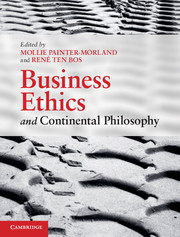Book contents
- Frontmatter
- Contents
- Figures
- Boxes
- Contributors
- Foreword
- Acknowledgements
- Introduction: critical crossings
- 1 Agency in corporations
- 2 Stakeholder theory
- 3 Organizational culture
- 4 Enron narrative
- 5 Moral decision-making
- 6 Organizational justice
- 7 Reward, incentive, and compensation
- 8 Leadership
- 9 Whistle-blowing
- 10 Marketing, bad faith, and responsibility
- 11 Corporate social responsibility
- 12 Corporate responsibility standards
- 13 Sustainability
- 14 Globalization
- Glossary
- Name index
- Subject index
- References
2 - Stakeholder theory
Published online by Cambridge University Press: 05 June 2012
- Frontmatter
- Contents
- Figures
- Boxes
- Contributors
- Foreword
- Acknowledgements
- Introduction: critical crossings
- 1 Agency in corporations
- 2 Stakeholder theory
- 3 Organizational culture
- 4 Enron narrative
- 5 Moral decision-making
- 6 Organizational justice
- 7 Reward, incentive, and compensation
- 8 Leadership
- 9 Whistle-blowing
- 10 Marketing, bad faith, and responsibility
- 11 Corporate social responsibility
- 12 Corporate responsibility standards
- 13 Sustainability
- 14 Globalization
- Glossary
- Name index
- Subject index
- References
Summary
Goals of this chapter
After reading this chapter you will be able to:
understand traditional stakeholder theory;
discuss its characteristics and indicative shortcomings;
critically evaluate stakeholder theory by considering Levinas's thinking.
Introduction
Simply put, a stakeholder is any group or individual who can affect, or is affected by, the achievement of a corporation's purpose. Stakeholders include employees, customers, suppliers, stockholders, banks, environmentalists, government and other groups who can help or hurt the corporation.
- Type
- Chapter
- Information
- Business Ethics and Continental Philosophy , pp. 37 - 60Publisher: Cambridge University PressPrint publication year: 2011
References
- 9
- Cited by



